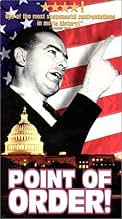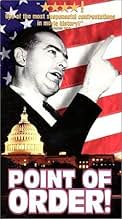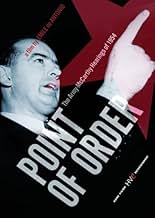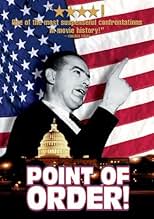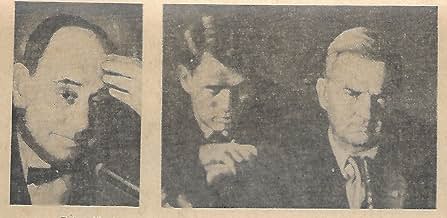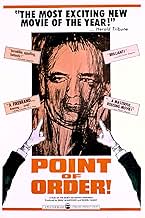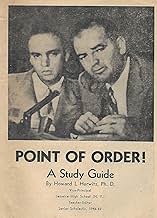An unfiltered, unflinching document of the notorious 1954 Army-McCarthy hearings, compiled entirely from raw TV footage (with no narration, music, or added scenes).An unfiltered, unflinching document of the notorious 1954 Army-McCarthy hearings, compiled entirely from raw TV footage (with no narration, music, or added scenes).An unfiltered, unflinching document of the notorious 1954 Army-McCarthy hearings, compiled entirely from raw TV footage (with no narration, music, or added scenes).
- Awards
- 1 win total
John G. Adams
- Self - U.S. Army counsel
- (archive footage)
Roy M. Cohn
- Self
- (archive footage)
Ray Jenkins
- Self
- (archive footage)
- (as Ray H. Jenkins)
Joseph McCarthy
- Self
- (archive footage)
John L. McClellan
- Self - U.S. Senator, Arkansas
- (archive footage)
Karl E. Mundt
- Self - U.S. Senator, South Dakota
- (archive footage)
G. David Schine
- Self - U.S. Army private
- (archive footage)
Robert T. Stevens
- Self - U.S. Secretary of the Army
- (archive footage)
Stuart Symington
- Self - U.S. Senator, Missouri
- (archive footage)
Joseph N. Welch
- Self
- (archive footage)
Featured reviews
Apparently the DVD's as of 2012 are expensive to obtain. My used one ran 50 bucks. Anyway, this is a slice of history that riveted the nation in those early days of coast-to-coast TV. Reviewer Mike Rice does a good job of filling in the background, so there's no need to repeat it here.
The documentary is an edited version of the 1954 senate hearings. On the whole, editing is to film footage what the eraser is to penciled composition. In short, astute editing can be used to create many, sometimes incompatible, effects. Now, I have no reason to believe editing was used here to skew any particular effect, but its potential for mischief is well to keep in mind.
Maybe it's my seven decades of breathing, but I did have some trouble following the narrative, and could have used some helpful bridges (a voice-over or graphics) to flesh out better continuity, especially when the topic of the Hearings changes. But whatever the difficulty, the legal fencing between experts is fascinating to watch. Note, for example, how no one on either side responds with a simple yes or no.
Naturally, most viewers approach the material with their own political pre-conceptions. I have mine, still I want to venture several observations not rooted, I believe, in my politics. Firstly, I don't recall seeing clips of McCarthy smiling before; here he at times appears almost affable, contrary to his usual sour image. Secondly, Welch is one eloquent attorney who really knows how to think on his feet. The usual brief clips of "Have you no sense of decency" only hint at those abilities. Then too, he's so unprepossessing looking you don't expect him to dominate the way he sometimes does. Lastly, I'd really like to know who concocted that phony letter from Hoover, along with the cropped photo. I may have missed something, but I don't believe those questions are resolved in the footage.
Be that as it may, Point of Order is real life dramatics at its most fascinating and remains an important slice of post-war history, from which the junior senator from Wisconsin never really recovered.
The documentary is an edited version of the 1954 senate hearings. On the whole, editing is to film footage what the eraser is to penciled composition. In short, astute editing can be used to create many, sometimes incompatible, effects. Now, I have no reason to believe editing was used here to skew any particular effect, but its potential for mischief is well to keep in mind.
Maybe it's my seven decades of breathing, but I did have some trouble following the narrative, and could have used some helpful bridges (a voice-over or graphics) to flesh out better continuity, especially when the topic of the Hearings changes. But whatever the difficulty, the legal fencing between experts is fascinating to watch. Note, for example, how no one on either side responds with a simple yes or no.
Naturally, most viewers approach the material with their own political pre-conceptions. I have mine, still I want to venture several observations not rooted, I believe, in my politics. Firstly, I don't recall seeing clips of McCarthy smiling before; here he at times appears almost affable, contrary to his usual sour image. Secondly, Welch is one eloquent attorney who really knows how to think on his feet. The usual brief clips of "Have you no sense of decency" only hint at those abilities. Then too, he's so unprepossessing looking you don't expect him to dominate the way he sometimes does. Lastly, I'd really like to know who concocted that phony letter from Hoover, along with the cropped photo. I may have missed something, but I don't believe those questions are resolved in the footage.
Be that as it may, Point of Order is real life dramatics at its most fascinating and remains an important slice of post-war history, from which the junior senator from Wisconsin never really recovered.
"Have you ever heard of the Venona Project?" Yes, i have. Have you ever actually compared those named by Venona with those accused by McCarthy, or did you accept what many authors write without double checking? I've been attempting to do just that.
I know, I've read many articles saying "are showing that McCarthy was right in nearly all his accusations.", but I'm looking for specifics.
I'm using a "List_of_Americans_in_the_Venona_papers" (from that on-line encyclopedia this thing doesn't like the name of) If someone wants to add or subtract from that list, i welcome it. I see Lattimore mentioned on some sites, but he wasn't identified by Venona.
Looking at lists put together by McCarthy supporter websites there are two who were accused by McCarthy also identified by Venona, Mary Jane Keeney (accused of being a Communist by McCarthy in 1950; Venona and other evidence indicates Soviet espionage activity) and Lauchlin Currie (Briefly mentioned by McCarthy in 1951). A third, Annie Lee Moss, implicated by other evidence (Later evidence indicates her name was on CPUSA membership list.) Some of the names listed (such as the Rosenbergs) were identified by Venona, but weren't among those who McCarthy identified.
Some names on the accused list people might recognize as left-wingers, but they were not identified by Venona, but sources i found said there is no evidence they were communists: Edward Murrow, John Garfield, Charlie Chaplin. Arthur Miller, i guess you could count him as one of McCarthy great finds, as he admitted in his autobiography of going to a few meetings. But he wasn't named as a spy by Venona.
The book by Arthur Herman "Joseph McCarthy: Reexamining the Life and Legacy of America's Most Hated Senator" is mentioned by McCarthy supporters. Reviews of that book indicate it is a balanced history, hardly exonerating McCarthy. One reviewer writes "Rather than trying to rehabilitate McCarthy, Herman is at pains to demonstrate McCarthy's mendacity, sloppiness in making allegations and his many other flaws on nearly every page."
I'd like to provide links, but not allowed here i guess.
I know, I've read many articles saying "are showing that McCarthy was right in nearly all his accusations.", but I'm looking for specifics.
I'm using a "List_of_Americans_in_the_Venona_papers" (from that on-line encyclopedia this thing doesn't like the name of) If someone wants to add or subtract from that list, i welcome it. I see Lattimore mentioned on some sites, but he wasn't identified by Venona.
Looking at lists put together by McCarthy supporter websites there are two who were accused by McCarthy also identified by Venona, Mary Jane Keeney (accused of being a Communist by McCarthy in 1950; Venona and other evidence indicates Soviet espionage activity) and Lauchlin Currie (Briefly mentioned by McCarthy in 1951). A third, Annie Lee Moss, implicated by other evidence (Later evidence indicates her name was on CPUSA membership list.) Some of the names listed (such as the Rosenbergs) were identified by Venona, but weren't among those who McCarthy identified.
Some names on the accused list people might recognize as left-wingers, but they were not identified by Venona, but sources i found said there is no evidence they were communists: Edward Murrow, John Garfield, Charlie Chaplin. Arthur Miller, i guess you could count him as one of McCarthy great finds, as he admitted in his autobiography of going to a few meetings. But he wasn't named as a spy by Venona.
The book by Arthur Herman "Joseph McCarthy: Reexamining the Life and Legacy of America's Most Hated Senator" is mentioned by McCarthy supporters. Reviews of that book indicate it is a balanced history, hardly exonerating McCarthy. One reviewer writes "Rather than trying to rehabilitate McCarthy, Herman is at pains to demonstrate McCarthy's mendacity, sloppiness in making allegations and his many other flaws on nearly every page."
I'd like to provide links, but not allowed here i guess.
The best thing about this documentary is that there is no narration, there is no commentary; clips of the Army-McCarthy hearings that finally brought an end to Joseph McCarthy and his era of bully politics that destroyed so many American lives. There are arguments both pro and con re: McCarthy and his basic premise (that Communists had infiltrated Hollywood and the American government, indeed, all the way to the Executive Branch). He may have had a valid point at one time or another, but it quickly became overshadowed by his ego and insatiable appetite for power.
Sound like anyone we've seen recently in Washington? I recommend viewing this riveting film as it is not partisan - it is McCarthy in all his egomaniacal ranting and raving against those who stood by their personal beliefs and held firm in their convictions that the Constitution of the United States of America would forever be their guide.
Sound like anyone we've seen recently in Washington? I recommend viewing this riveting film as it is not partisan - it is McCarthy in all his egomaniacal ranting and raving against those who stood by their personal beliefs and held firm in their convictions that the Constitution of the United States of America would forever be their guide.
Roy Cohn keeps popping up in American culture, from his fictionalized roles in "ANGELS IN America"-- as interpreted by Al Pacino (actor), Tony Kushner (playwrite), and Mike Nichols (director) --and Kurt Vonnegut's "JAILBIRD," to his actual deeds as documented by the likes of Emile de Antonio here in "POINT OF ORDER." Although there have been some attempts to put Cohn in perspective-- Frank Pierson's awful HBO film, "CITIZEN COHN," comes to mind (with James Woods' cartoon performance), I believe we've yet to see anything approaching a definitive look at him and his legacy.
As for McCarthy and McCarthyism, "POINT OF ORDER" stands as an excellent non-fiction introduction to the beginning of their ends. It's great drama, and it's full of truth. And that is all. "POINT OF ORDER" is where one can start, yet not where one may find real answers.
As for McCarthy and McCarthyism, "POINT OF ORDER" stands as an excellent non-fiction introduction to the beginning of their ends. It's great drama, and it's full of truth. And that is all. "POINT OF ORDER" is where one can start, yet not where one may find real answers.
Without narration, this documentary presents audio-visual excerpts from the famous Army-McCarthy hearings of 1954. The televised hearings were significant in that they brought to light the mean-spirited, and unfounded, accusations of an American demagogue, Wisconsin Senator Joseph McCarthy, a man who claimed that certain individuals, both in the U.S. Army and elsewhere in American government, were Communist spies.
What is glaringly obvious, from this documentary, is that McCarthy had no evidence. He and his chief counsel, Roy Cohn, accused, implicated, vilified, and pointed fingers. And the political climate in the 1950s was such that even these accusations were enough to destroy the careers and lives of many individuals. McCarthy, an ambitious politician, used fear as a weapon, which contributed to unwarranted suspicion during the Cold War.
The hearings are theatrical, Shakespearean drama, in part. Several times, impassioned speeches are made. At other times, the proceedings are laughably petty, like when the committee examines a photograph of Army Private David Schine (pronounced Shine). The subtext during this segment is that David Schine and Roy Cohn had some sort of homosexual relationship, an ironic development, given that Cohn and McCarthy, as political Conservatives, would be just as hostile to homosexuals as to Communists.
One might think that "Point Of Order" would be dry and boring. But the political atmosphere was so charged, so on-edge, that the viewer can easily discern the tension, the fear, and the anxiety of people who had no idea how these events would play out.
McCarthy probably thought these hearings would be a stepping stone en route to the White House. Instead, the camera, as hero, revealed to the American people that McCarthy was a fear monger. Television was his downfall. And the overall message of "Point Of Order" is that enhanced communications technology, in this case television, can be used to thwart the plans of would-be dictators and tyrants.
Today, money has corrupted television. But communications technology continues to evolve, and the internet now functions as a medium that shines lights into dark corners, as television did fifty years ago.
What is glaringly obvious, from this documentary, is that McCarthy had no evidence. He and his chief counsel, Roy Cohn, accused, implicated, vilified, and pointed fingers. And the political climate in the 1950s was such that even these accusations were enough to destroy the careers and lives of many individuals. McCarthy, an ambitious politician, used fear as a weapon, which contributed to unwarranted suspicion during the Cold War.
The hearings are theatrical, Shakespearean drama, in part. Several times, impassioned speeches are made. At other times, the proceedings are laughably petty, like when the committee examines a photograph of Army Private David Schine (pronounced Shine). The subtext during this segment is that David Schine and Roy Cohn had some sort of homosexual relationship, an ironic development, given that Cohn and McCarthy, as political Conservatives, would be just as hostile to homosexuals as to Communists.
One might think that "Point Of Order" would be dry and boring. But the political atmosphere was so charged, so on-edge, that the viewer can easily discern the tension, the fear, and the anxiety of people who had no idea how these events would play out.
McCarthy probably thought these hearings would be a stepping stone en route to the White House. Instead, the camera, as hero, revealed to the American people that McCarthy was a fear monger. Television was his downfall. And the overall message of "Point Of Order" is that enhanced communications technology, in this case television, can be used to thwart the plans of would-be dictators and tyrants.
Today, money has corrupted television. But communications technology continues to evolve, and the internet now functions as a medium that shines lights into dark corners, as television did fifty years ago.
Did you know
- TriviaIncluded in The New Republic's list of "The 100 Most Important Political Films of All Time."
- ConnectionsFeatured in McCarthy: Death of a Witch Hunter (1975)
Details
- Release date
- Country of origin
- Language
- Also known as
- Herr ordförande! En ordningsfråga
- Production company
- See more company credits at IMDbPro
- Runtime
- 1h 37m(97 min)
- Color
- Sound mix
- Aspect ratio
- 1.37 : 1
Contribute to this page
Suggest an edit or add missing content

